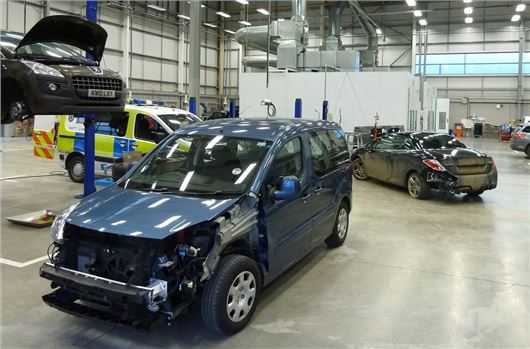Can you buy back a van that has been written off?

In some cases your insurer will declare that your van or pick-up is not economical to repair. However, you don't have to accept the write off. You could 'buy it back'. But how do you buy back a vehicle you already own?
Retaining a Cat D is extremely unwise because you're liable to being misled by your insurer. Here's why. Imagine the repair costs on your £10,000 van is £8500. Your insurer advises you that the vehicle is a Cat D total loss, but you can keep it for £3000.
This means you get £7000, plus your van back unrepaired. But it now has the stigma of being a Cat D. And the market value is at least 20 per cent less than it would be without.
We already know it is going to cost £8500 to repair, so even using second hand parts you would struggle to repair for £7000 you received. Once you have spent your £7000 your van's now only worth £8000.
Contrary to what every insurer and pretty much anyone you speak to will tell you, yes you can retain a Cat B total loss.
Had you asked for a cash in lieu settlement, you would have received the £8500 and still have a vehicle that is not a total loss. In other words you would be at least £2000 better off.
Insurers do not like providing a cash settlement at higher figures. They prefer to reduce the risk of fraud and they have the contractual right to offer to repair. You can also insist on the vehicle being repaired.
In both situations, your van has been (or should be) repaired to manufacturer standards. So it should still be worth approximately what it was prior to the accident.
Do not forget, read your contract of insurance. It will state you are indemnified up to the market value. The insurer only has the right to retain the vehicle when they have bought the vehicle off you. Up to that point the vehicle is always yours.
What about retaining a Category C total loss?
This is where the repair costs exceed the market value. So the vehicle when repaired will be worth approximately 20 to 30 percent less than a vehicle without this history.
If the vehicle has any structural damage, walk away. Unless you are a professional commercial vehicle repairer or have access to one, we would not recommend you contemplate retaining. The only time it makes sense to retain a Cat C vehicle is if there is cosmetic damage, or when the panels damaged are 'hang on' panels such as front wings, bumpers and doors.
Can you keep a Category B loss?
Contrary to what every insurer and pretty much anyone you speak to will tell you, yes you can retain a Cat B total loss. The question again though is why?
These vehicles can never go back on the road. You will not be able to obtain a V5C and you will never be able to tax or insure it.
The only time we would suggest retaining a Cat B is if you either have a classic vehicle - and the parts are extremely rare and hard to come by - or you have a modified vehicle and wish to retain the parts you have fitted.
>> What's the difference between a Cat C and Cat D write off?
This could be on anything, from a vehicle with engine and suspension modifications, to a van that has been converted into a camper. There is a possible third - retaining a flood damaged vehicle and converting it into a track or off road vehicle.
You may find the insurer will request a certificate of destruction of the shell of the vehicle, once all the items required have been stripped.
What must be remembered is the Code of Practice for the disposal of salvage is just that. It is not lawful and is not under an Act of Parliament. This means it cannot be enforced on a consumer.
This is why it needs to change. At the moment anyone can get their hands on any salvage. As a consequence, a vehicle that has a category loss against it can be on the road but not repaired safely. Insurers need to stop profiteering by selling salvage as "constructive total losses" and repair them correctly.

 VW adds Sportline trim to Transporter range
VW adds Sportline trim to Transporter range
 Mercedes reveals new Marco Polo camper van
Mercedes reveals new Marco Polo camper van
 Ford Ranger revised for 2026 with styling tweaks and new trims
Ford Ranger revised for 2026 with styling tweaks and new trims
 New Renault Trafic for 2026 revealed
New Renault Trafic for 2026 revealed
 Toyota reveals all-new Hilux pick-up
Toyota reveals all-new Hilux pick-up
 Over a quarter of van drivers suffer mental health issues
Over a quarter of van drivers suffer mental health issues
 New Land Rover Defender pick-up revealed
New Land Rover Defender pick-up revealed


